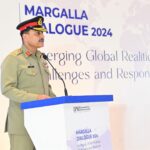ISLAMABAD, Pakistan: Minister for Railways Khawaja Saad Rafique on Wednesday urged Islamic Development and Economic Cooperation Organization Trade and Development Bank to promote investment in railways to better connectivity among ECO states.
“I have already talked to Asian Development Bank (ADB) and would urge IDB and ECO Trade and Development Bank to contribute to economic and social development of the ECO region,” he said addressing the 9th high level Working Group meeting of ECO Container Train on Islamabad-Tehran-Istanbul route.
“I also urge these banks to for investment and forming alliances with other international financial institutions to promote investment in railways infrastructure,” the minister said and hoped, it would revolutionize economy of these countries and bring prosperity to the common man.
He said the Pakistan government is determined to provide sovereign guarantee to IDB and the consortium and may provide financing terms of trade to Pakistan from Quetta/Taftan section connecting Afghanistan, Pakistan, Iran and Turkey.
“We have already arranged approximately US$ eight billion financing to upgrade the main line ML1 with the Chinese institutions and they would spend six to seven years. The arrangement of financing to link Gwadar with railways network is also underway.”
Saad Rafique said that maximizing connectivity, mobility and accessibility by making major communications corridors commercially viable and accessible would benefit the regional nations.
The minister said, in 2015 the overall GDP of the ECO countries was US$ 4.7 trillion and total intra-ECO trade volume was stood at only US$ 58 billion which was far below to its true potential.
“I am confident that the target of ECO union 2025 will be realized through trade, transportation and cross border movements and infrastructure improvement.”
He said a few years back Islamabad-Tehran-Istanbul train formerly known as Goods Train was initiated by Pakistan, Iran and Turkey to foster trade through rail, however this operation could not sustain due to various problems.
“I expect that participants of this high level working group will examine all its possibilities to come up with practical solutions to ensure regular running of the ITI train besides developing consensus on its tariff and charges and infrastructure improvement and development of exclusive corridors and management of ITI trains corridor.”
Saad Rafique said, integrated regional transport system means that a person coming from Kabul or Dhaka should be able to travel to London or anywhere in Europe through Pakistan, Iran and Turkey and expressed confidence that it was quite achievable with the technological innovations available now regarding change of gauge.
“This will require political will of the governments in all issues causing road block in regional connectivity and adopt a joint integrated planning approach to achieve this goal.”
He mentioned to two objectives of Pakistan Railway including improvement in inspection of its network and connectivity with the railway network of the region and said, these objectives focus on promoting regional trade.
In this context, he informed that Pakistan Railway is working on a master plan to upgrade its three main arteries; ML1 from Peshawar to Karachi, ML2 from Attack to Kotri and ML3 from Quetta to Taftan and from Iran and Turkey.
The minister said poor condition of railways track from Quetta to Taftan is a major bottleneck in regional connectivity and onwards to Europe while the rail links from Chaman to Spin Boldak to Kandahar and onwards connecting to Turkmenistan is also under consideration.
“This will ensure that Gwadar Sea Port is used to its full potential to transport goods to Afghanistan and landlocked Central Asian Republics.”
Similarly, he said, the connectivity of Gwadar port with Khunjrab through ML2 and the Western Corridor of ML3 via Dera Ismail Khan will provide shortest access to Chinese goods to warm waters.
“I am confident that up-gradation of Pakistan Railway and connectivity of the regional railways would usher a new era of prosperity in Pakistan and the neighboring countries.”
Saad Rafique expressed confidence that through untiring efforts and with the cooperation of international and regional financial institutions in next decade, the regional nations would be able to develop fast track railway infrastructure to benefit natives of the whole region.
Source: APP/DND





